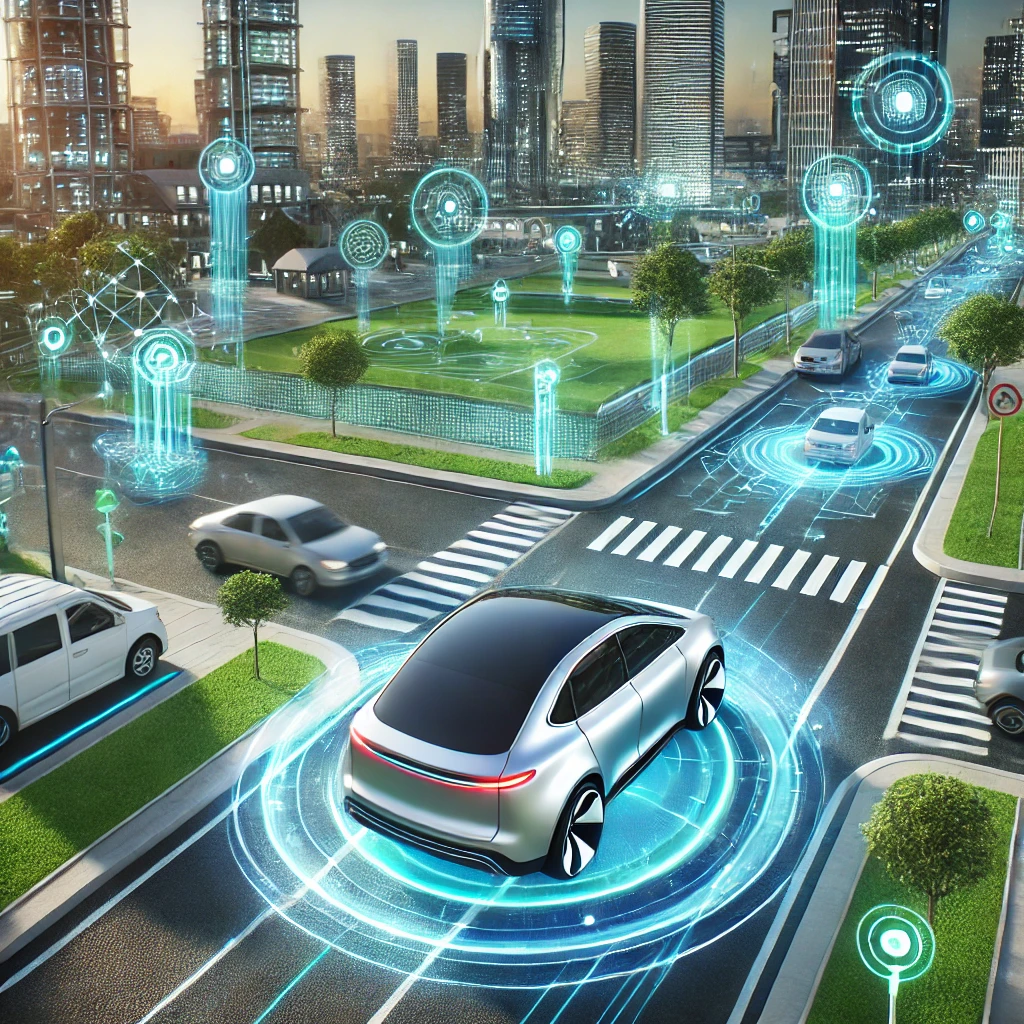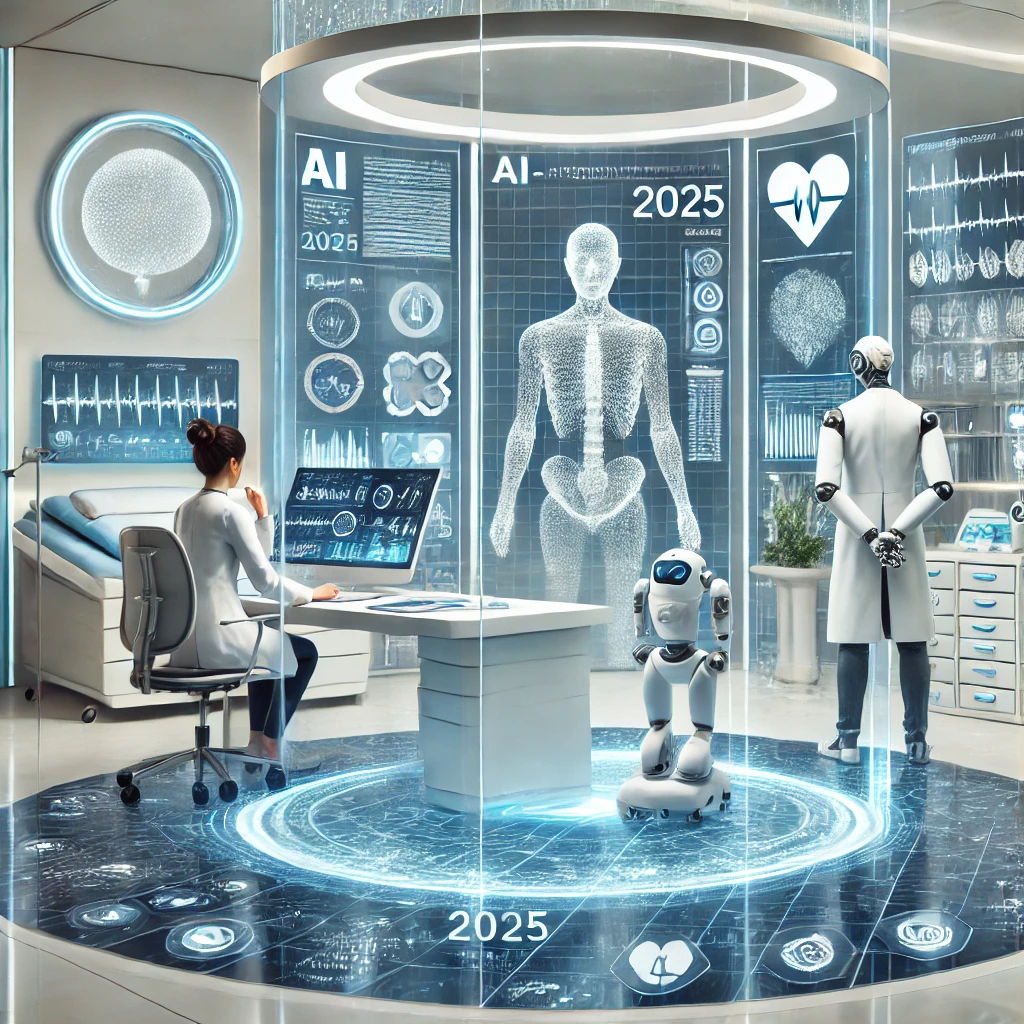Artificial Intelligence (AI) is no longer a concept of the distant future; it is here and transforming industries, societies, and economies at an unprecedented pace. As we approach 2025, AI’s impact is becoming more evident, with innovations poised to revolutionize every aspect of our lives. This article explores the potential of AI in 2025, its key advancements, and the challenges it faces.
AI in Healthcare: A New Era of Precision and Accessibility
One of the most profound impacts of AI in 2025 will be seen in healthcare. AI-driven tools are already enhancing diagnostic accuracy, streamlining treatment plans, and predicting patient outcomes. By 2025, we expect AI to:
- Revolutionize Diagnostics: Advanced AI algorithms will analyze medical imaging, genetic data, and electronic health records with unparalleled precision. This will enable early detection of diseases such as cancer and Alzheimer’s, significantly improving survival rates.
- Personalized Medicine: AI-powered platforms will offer customized treatment plans based on individual genetic profiles, lifestyle, and medical history. This will lead to more effective treatments and fewer adverse reactions.
- Telemedicine Expansion: AI chatbots and virtual health assistants will make healthcare more accessible, especially in remote areas, reducing the strain on healthcare systems.
Autonomous Vehicles: Driving Towards a Safer Future
By 2025, autonomous vehicles (AVs) will be a common sight on roads worldwide. AI technology, coupled with advanced sensors and 5G connectivity, will make self-driving cars safer, more efficient, and environmentally friendly. Key developments include:
- Improved Safety: AI systems will predict and prevent accidents by analyzing real-time data from traffic patterns, weather conditions, and road hazards.
- Enhanced Mobility: AVs will provide mobility solutions for individuals unable to drive, such as the elderly and disabled, fostering greater independence.
- Sustainability: Electric AVs will reduce greenhouse gas emissions, contributing to global efforts to combat climate change.
AI and the Workforce: Automation and Reskilling
The rise of AI has raised concerns about job displacement, but it also presents opportunities for workforce transformation. By 2025:
- New Job Creation: AI-driven industries will create new roles in fields such as AI ethics, algorithm auditing, and machine learning engineering.
- Reskilling Initiatives: Governments and organizations will prioritize reskilling programs to prepare workers for AI-enhanced roles, ensuring a smooth transition for the workforce.
- Increased Productivity: AI will automate repetitive tasks, allowing employees to focus on creative and strategic aspects of their jobs.
AI in Education: Personalized and Inclusive Learning
Education will be another sector profoundly impacted by AI. By 2025, AI will make learning more personalized and inclusive:
- Adaptive Learning Platforms: AI-driven tools will assess students’ strengths and weaknesses, tailoring lessons to meet individual needs.
- Global Access: AI will bridge language barriers, making quality education accessible to learners worldwide through real-time translation and virtual classrooms.
- Skill Development: AI-powered platforms will provide training in emerging technologies, ensuring students are equipped for the jobs of the future.
Ethical and Regulatory Challenges
Despite its promise, AI development in 2025 will face significant ethical and regulatory challenges:
- Bias and Fairness: Ensuring AI systems are free from biases and treat all users fairly will be a top priority.
- Data Privacy: Striking a balance between data utilization and privacy protection will require robust regulations and transparent practices.
- AI Governance: Governments and organizations must collaborate to establish global standards for AI ethics and safety.
The Role of AI in Climate Change Mitigation
As climate change remains a pressing global issue, AI will play a crucial role in mitigation efforts by 2025:
- Energy Optimization: AI algorithms will optimize energy consumption in industries and households, reducing carbon footprints.
- Environmental Monitoring: AI-powered drones and satellites will monitor deforestation, wildlife populations, and pollution levels in real-time.
- Smart Agriculture: AI tools will enhance crop yields and water efficiency, supporting sustainable farming practices.
AI in Entertainment: Redefining Creativity
The entertainment industry will witness a creative renaissance driven by AI innovations in 2025:
- Content Creation: AI algorithms will generate music, art, and literature, offering new avenues for creative expression.
- Personalized Experiences: AI will analyze viewer preferences to deliver highly customized entertainment experiences.
- Virtual Reality (VR): AI-powered VR platforms will create immersive worlds for gaming, education, and social interaction.
Cybersecurity: Strengthening Digital Defenses
As cyber threats evolve, AI will become a critical component of cybersecurity by 2025:
- Threat Detection: AI systems will identify and neutralize cyber threats in real-time, reducing the risk of data breaches.
- Fraud Prevention: AI tools will detect fraudulent activities in financial transactions, ensuring secure digital ecosystems.
- Incident Response: Automated response systems will mitigate the impact of cyberattacks, safeguarding critical infrastructure.
Conclusion: Embracing the AI Revolution
By 2025, AI will be an integral part of our lives, transforming industries and addressing global challenges. While its potential is vast, the ethical and regulatory hurdles must be navigated carefully to ensure AI serves humanity’s best interests. As we stand on the brink of this transformative era, embracing AI with a forward-thinking and responsible approach will be key to unlocking its full potential.

